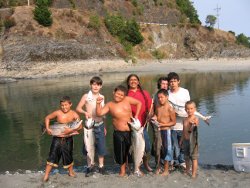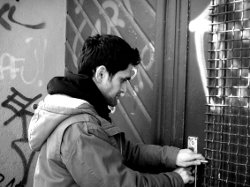Estonia/Norway/USA, 2008, 60 min
Liivo Niglas, Diane Perlov, Frode Storaas
30.01.2010 14:05
 The Klamath River of Oregon and California is one of the most important salmon runs in the United States. While diminished over the past 100 years, it still supports an abudance of life and diverse economies struggling over its future course. This is a film about the Indian tribes of the river ecosystem – what the Klamath means to them and how they draw on traditional and modern resources to restore its strenght, beauty and balance. The film focuses on the Klamath River and the Indian tribes of the lower basin – the Yurok, Hoopa and Karuk. Yet this story has implications for any number of river ecosystems and indigenous peoples around the world. Through the Indian tribes of the Lower Klamath, the film reminds us how the health of a people and the health of its lands are integrally linked.
The Klamath River of Oregon and California is one of the most important salmon runs in the United States. While diminished over the past 100 years, it still supports an abudance of life and diverse economies struggling over its future course. This is a film about the Indian tribes of the river ecosystem – what the Klamath means to them and how they draw on traditional and modern resources to restore its strenght, beauty and balance. The film focuses on the Klamath River and the Indian tribes of the lower basin – the Yurok, Hoopa and Karuk. Yet this story has implications for any number of river ecosystems and indigenous peoples around the world. Through the Indian tribes of the Lower Klamath, the film reminds us how the health of a people and the health of its lands are integrally linked.
Awards: Diploma, Matsalu International nature Film Festival, Estonsko 2009; Finalist, Kyoto University Museum Academic Film Competition, Japonsko 2009
Language of dialogues: English
Czech Republic, 2008, 32 min
Štěpánka Plachá, Michaela Píšová
30.01.2010 16:25
 Thanks this movie you can entry into the daily lives of Goluboies inhabitans.The village of Goluboie is original village in Moldova where Czechs live. They setteled this part of southern Moldova in the second half of 19th century. During the summer of 2006 the village had 130 inhabittans of Czech nationality.Movie shoes their daily routine and life style which is mainly based on agriculture (bee-keeping, breeding of domestic animals etc.). On the other hand you can meet with 150 years old original Czech brass band, deeply connected with this village.One of the topics is also question of Czech identity. Which factors have impact of the identity? Is it Czech language or origin of their ancestors?
Thanks this movie you can entry into the daily lives of Goluboies inhabitans.The village of Goluboie is original village in Moldova where Czechs live. They setteled this part of southern Moldova in the second half of 19th century. During the summer of 2006 the village had 130 inhabittans of Czech nationality.Movie shoes their daily routine and life style which is mainly based on agriculture (bee-keeping, breeding of domestic animals etc.). On the other hand you can meet with 150 years old original Czech brass band, deeply connected with this village.One of the topics is also question of Czech identity. Which factors have impact of the identity? Is it Czech language or origin of their ancestors?
Language of dialogues: Czech
Slovakia/Slovenia/Denmark, 2008, 19 min
Sašo Niskač
29.01.2010 22:20
 Salaam Aleykum Copenhagen is a short documentary about Haluk, Allan and Iman – two young boys and a girl with Turkish, Kurdish, Lebanese and Danish backgrounds living in Copenhagen. How do they confront their lives with the atmosphere of Copenhagen, their home? The film is a portrait of their attitudes towards the questions of immigration and integration, their daily problems and challenges, family values, their view on Danish society and Copenhagen itself. While presenting their worlds they are opening the doors towards understanding of Copenhagen itself. They are part of Copenhagen and Copenhagen is part of them.
Salaam Aleykum Copenhagen is a short documentary about Haluk, Allan and Iman – two young boys and a girl with Turkish, Kurdish, Lebanese and Danish backgrounds living in Copenhagen. How do they confront their lives with the atmosphere of Copenhagen, their home? The film is a portrait of their attitudes towards the questions of immigration and integration, their daily problems and challenges, family values, their view on Danish society and Copenhagen itself. While presenting their worlds they are opening the doors towards understanding of Copenhagen itself. They are part of Copenhagen and Copenhagen is part of them.
“...It is hard and then people say: you are well integrated, and I think: what is “well integrated”? Is it when Danes feel I am well integrated or the immigrants feel I am well integrated? Or is it when I myself feel that now I can tackle the two cultures?”...”I have learned to drink my girlfriend’s homeopathic drops, medicine, and she drinks my Kurdish tea each day, and that is for example integration. But I am tired of the word ‘integration’.”
Awards: Special Jury Mention, Platforma Video8 Fil Festival, November 2008, Athens, Greece; selected for The Best of Kino OTOK Film Festival - Video na Plazi, october 2009, Izola, Slovenia
Language of dialogues: Danish
Language of subtitles: English
 The Klamath River of Oregon and California is one of the most important salmon runs in the United States. While diminished over the past 100 years, it still supports an abudance of life and diverse economies struggling over its future course. This is a film about the Indian tribes of the river ecosystem – what the Klamath means to them and how they draw on traditional and modern resources to restore its strenght, beauty and balance. The film focuses on the Klamath River and the Indian tribes of the lower basin – the Yurok, Hoopa and Karuk. Yet this story has implications for any number of river ecosystems and indigenous peoples around the world. Through the Indian tribes of the Lower Klamath, the film reminds us how the health of a people and the health of its lands are integrally linked.
The Klamath River of Oregon and California is one of the most important salmon runs in the United States. While diminished over the past 100 years, it still supports an abudance of life and diverse economies struggling over its future course. This is a film about the Indian tribes of the river ecosystem – what the Klamath means to them and how they draw on traditional and modern resources to restore its strenght, beauty and balance. The film focuses on the Klamath River and the Indian tribes of the lower basin – the Yurok, Hoopa and Karuk. Yet this story has implications for any number of river ecosystems and indigenous peoples around the world. Through the Indian tribes of the Lower Klamath, the film reminds us how the health of a people and the health of its lands are integrally linked.
 Thanks this movie you can entry into the daily lives of Goluboies inhabitans.The village of Goluboie is original village in Moldova where Czechs live. They setteled this part of southern Moldova in the second half of 19th century. During the summer of 2006 the village had 130 inhabittans of Czech nationality.Movie shoes their daily routine and life style which is mainly based on agriculture (bee-keeping, breeding of domestic animals etc.). On the other hand you can meet with 150 years old original Czech brass band, deeply connected with this village.One of the topics is also question of Czech identity. Which factors have impact of the identity? Is it Czech language or origin of their ancestors?
Thanks this movie you can entry into the daily lives of Goluboies inhabitans.The village of Goluboie is original village in Moldova where Czechs live. They setteled this part of southern Moldova in the second half of 19th century. During the summer of 2006 the village had 130 inhabittans of Czech nationality.Movie shoes their daily routine and life style which is mainly based on agriculture (bee-keeping, breeding of domestic animals etc.). On the other hand you can meet with 150 years old original Czech brass band, deeply connected with this village.One of the topics is also question of Czech identity. Which factors have impact of the identity? Is it Czech language or origin of their ancestors? Salaam Aleykum Copenhagen is a short documentary about Haluk, Allan and Iman – two young boys and a girl with Turkish, Kurdish, Lebanese and Danish backgrounds living in Copenhagen. How do they confront their lives with the atmosphere of Copenhagen, their home? The film is a portrait of their attitudes towards the questions of immigration and integration, their daily problems and challenges, family values, their view on Danish society and Copenhagen itself. While presenting their worlds they are opening the doors towards understanding of Copenhagen itself. They are part of Copenhagen and Copenhagen is part of them.
Salaam Aleykum Copenhagen is a short documentary about Haluk, Allan and Iman – two young boys and a girl with Turkish, Kurdish, Lebanese and Danish backgrounds living in Copenhagen. How do they confront their lives with the atmosphere of Copenhagen, their home? The film is a portrait of their attitudes towards the questions of immigration and integration, their daily problems and challenges, family values, their view on Danish society and Copenhagen itself. While presenting their worlds they are opening the doors towards understanding of Copenhagen itself. They are part of Copenhagen and Copenhagen is part of them.